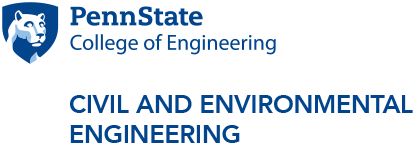
Structural Engineering and Mechanics Research
The planning, analysis, and design of structures and their materials pose some of the most interesting and challenging problems encountered by the engineering profession.
Faculty in this research area focus on:
- Design optimization
- Structural optimization
- Design under uncertainty
- Decision theory and analysis
- Nonlinear dynamics and control
- Probabilistic analysis
- Structural reliability
- Uncertainty quantification
- Decision making under uncertainty
- Stochastic control
- Optimization and inverse analysis
- Computational structural mechanics
- Machine learning and Artificial Intelligence
- Accelerated meshfree methods for extreme deformation analysis
- Stabilized nodal integration in Galerkin meshfree methods
- Physics-based shock modeling
- Image-based modeling of fracture in composite microstructures
There is a vigorous research program in Structural Engineering and Mechanics (SEM) here at Penn State. The project titles, principal investigators, and other information on these research contracts and grants is listed below.
RSB/Collaborative Research: A Sequential Decision Framework to Support Trade Space Exploration of Multi-Hazard Resilient and Sustainable Building Designs, PI: G. Warn, Co-PIs: T. Simpson, L. Iulo. National Science Foundation, $899,189. 03/2015--09/2021.
ROCKET Seed Grant: Design synthesis through deep reinforcement learning, PI: G.Warn. Penn State, College of Engineering, $60,000, 01/2020–5/2021
Serviceability of Staged Bridges, Pennsylvania Department of Transportation, PI: A. Radlinska, Co-PI: G. Warn, $199,762, 12/2019--12/2021
CAREER: Optimal engineering decision-making under uncertainties for enhanced structural life-cycle, PI:Papakonstantinou, NSF, $500,000, 2018-2023.
A nonlinear programming paradigm for hybrid elements formulation towards high-performance collapse simulations, PI:Papakonstantinou, NSF, $296,934, 2016-2021.
Deep reinforcement learning for multi-asset infrastructure management incorporating traffic operations adaptations and control, PI:Papakonstantinou, Co-PIs: Stoffels, Miller-Hooks (George Mason), Region 3 University Transportation Center, U.S. Department of Transportation (USDOT), $192,710, 2021-2023.
Strategic prioritization and planning for multi-asset transportation infrastructure maintenance, rehabilitation, and improvements: Phase 2 - Data-driven decisions from continuous monitoring, co-PI: Papakonstantinou, Region 3 University Transportation Center, U.S. Department of Transportation (USDOT), $150,000, 2021-2022.
AI-enabled fiscally constrained life-cycle asset management for infrastructure systems, PI:Papakonstantinou, Co-PIs: Guler, Gayah, Region 3 University Transportation Center, U.S. Department of Transportation (USDOT), $122,838, 2020-2021.
STTR phase II: Enhancing thermo-mechanically coupled computational models for high-temperature impact and fracture, PI: M. Hillman; Funding Source: Karagozian and Case, Inc.; Prime: Missile Defense Agency, Total awarded: $358,228, 2021-2023
Numerical modeling of 3D printable concrete, PI: A. Radlinska, co-PI: M. Hillman, Funding Source: Penn State, Total awarded: $60,000, 2021-2022
CAREER: A hybrid local-nonlocal peridynamics framework to model failure across deformations and strain rates, PI: M. Hillman; Funding Source: The National Science Foundation, Total awarded: $580,845, 2020-2025
Prototype of an enhanced and validated discrete-continuum particle method for microstructural failure simulation in high-performance concrete, PI: M. Hillman; Funding Source: U.S. Army Engineer Research and Development Center, Total awarded: $403,990, 2018-2021
An integrated computational-experimental approach to three-dimensional fracture in polymer-ceramic composites, PI: M. Hillman, Co-PI: J. Du; Funding Source: The National Science Foundation, Total awarded: $545,418, 2018-2021



